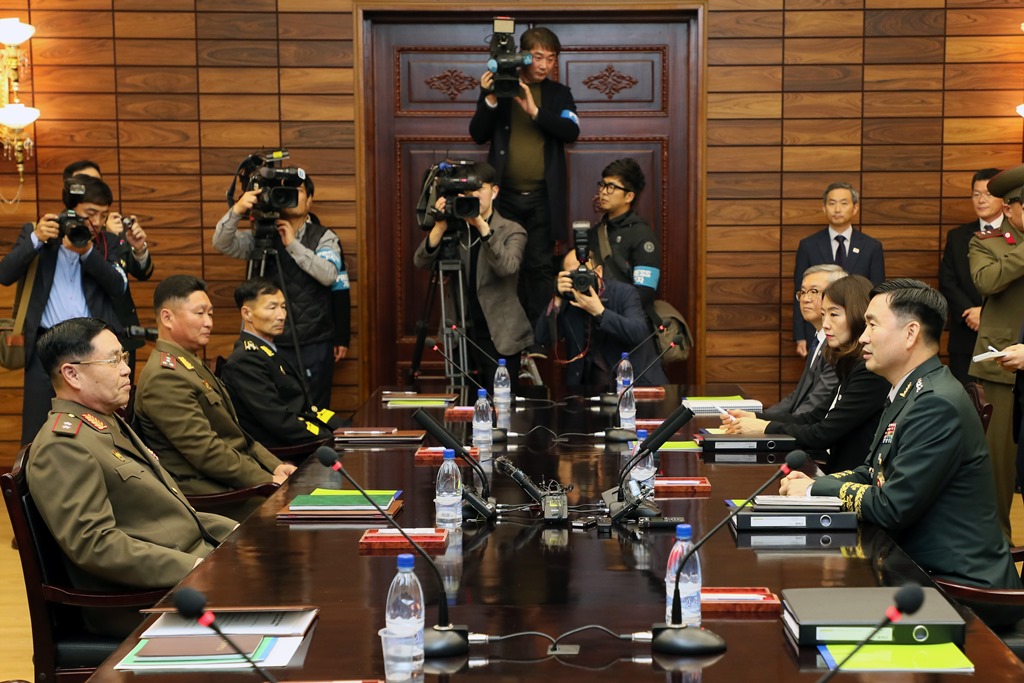Limitations of the Sanctions Policy towards North Korea

For more than a decade, sanctions have been the primary instrument of the UNSC in response to the development of North Korea’s nuclear and missile programmes. The main objective has been to get the North to return to the Six-Party Talks (the Korean states, China, Japan, Russia, U.S.) on denuclearisation that stalled in 2008. The impossibility of achieving this goal means that currently the restrictions are primarily aimed at slowing the North’s arms programs. The U.S. is the main advocate of the sanctions and the administration of Donald Trump has made them a pillar of its policy towards North Korea. Despite the ever-increasing restrictions, the North has made significant progress in building its deterrence arsenal. This demonstrates the limitations of the current approach to North Korea.
Characteristics of the Sanctions on North Korea
The basis of the sanctions regime is a set of UNSC resolutions. Nine of them have been adopted since 2006 and their scope has expanded. By 2016, the goal was to curb the North’s activities directly related to its arms programmes and proliferation. For this purpose, the resolutions introduced, among others, an embargo on arms trade, nuclear and missile dual-use technologies with North Korea, and cargo inspections to and from the North suspected of carrying prohibited products. The development of the North Korean nuclear-missile potential proved that the bans were insufficient. Therefore, sanctions have been imposed on as many sectors as possible that generate revenue for the North and have limited its access to international financial systems. Starting with Resolution 2270 of 2 March 2016, the UNSC—on the U.S. initiative—introduced sectoral sanctions that currently cover more than 90% of North Korean exports. States have been obliged to close foreign branches of the North’s banks, stop hiring North Korean labourers, and prohibit investment and joint ventures with North Korean enterprises and banks. The resolution also imposed on the North a ban on natural gas imports and limits on the import of crude oil and refined petroleum products.
Apart from the UN regulations, the EU has implemented bans and restrictions on the North since 2006. It has established additional lists of sanctioned individuals and entities suspected of affiliation with the prohibited North Korean programmes and circumvention of the bans. In addition, the U.S., South Korea, and Japan have imposed unilateral sanctions against North Korea. The U.S. has also applied economic restrictions on third countries, their citizens, and enterprises that cooperate with the North (secondary sanctions).
Why Have Sanctions Been Ineffective
The main reason for the ineffectiveness of the sanctions is they have not been sufficiently implemented and enforced by states required to adapt their internal law to the requirements of the UNSC resolutions. According to a September 2017 report by the UN Panel of Experts monitoring sanctions on North Korea, only 78 out of 192 countries reported to the UNSC Sanctions Committee they had implemented the most up-to-date resolution. The degree of implementation depends on the political will of the states and their perception of the North Korea problem. States differ in their understanding of the purposefulness of the sanctions policy, the scale of threats from North Korea, and the specifics of its activities. Other problems include underdeveloped customs services and insufficient exchange of information between banks and intelligence services. The implementation of restrictions has also been hampered by the difference of interests between permanent members of the UN Security Council: the U.S., China and Russia. While the U.S. supports severe sanctions, China and Russia are sceptical of them and reluctant to exert economic pressure on North Korea, fearing the collapse of the regime.
North Korea’s ability to evade the restrictions is yet another problem. It applies increasingly sophisticated techniques of circumventing and avoiding the sanctions, often violating legal norms and international customs. The North’s citizens abroad often operate under fake identities, using passports from other countries, e.g., when setting up businesses and bank accounts. Foreigners also conduct illicit activities for the regime, which makes it more difficult to detect links to North Korea. A common practice of the North is to register ships with prohibited goods under foreign flags. Thanks to falsified documentation, North Korean minerals, such as coal, are sold as originating in other countries (especially China and Russia) and sent to, e.g., Malaysia, Vietnam, and South Korea. Sanctioned activities are also carried out by North Korean diplomatic missions. For example, the North’s embassy in Berlin facilitated the transfer of dual-use materials for the purposes of the nuclear and missile programmes. The North Koreans also use contacts with businesses and local authorities in northeast China, where more than 2 million ethnic Koreans live. A common way to circumvent the prohibitions is to pay bribes to customs and carry a large amount of cash in hand luggage. North Koreans also benefit from visa facilitation (e.g., visa-free, visa-on-arrival and e-visa), currently offered to them by 39 dependent countries and territories.
As an effect, all these issues have led to the incomplete implementation of the sanctions in all categories. According to reports by the UN Panel of Experts, bans on the sale of luxury goods and the embargo on arms trade with North Korea are widely not followed. The latest reports mention the sale of North Korean chemical weapons to Syria and conventional and missile weapons to Myanmar. African countries remain an attractive market for the North’s arms and military training. Regular violations of the bans on the import of minerals from North Korean and the export of crude oil to it have been recorded in some countries. This applies, among others, to China, despite its announcement in February 2017 of a total ban on imports of minerals from North Korea. On the other hand, Russian ports in Kholmsk and Nakhodka receive ships with North Korean coal, which is then reloaded and sold, among others, to South Korea and Japan. Russia is also accused of selling North Korea oil by reloading it on ships in international waters.
It is problematic to implement sanctions at the local level in cross-border trade between China and North Korea. Despite more effective control institutions, it is impossible to implement mechanisms that guarantee full enforcement. Other problems include the growth of smuggling and the involvement of the private sector, driven by profit. These entities provide transport or intermediary services—often unknowingly—for the North’s illegal commercial and financial operations.
Conclusions
Although sanctions have hindered North Korea and negatively affected its economy, they have not changed its political objectives. The North still considers nuclear weapons and missiles its most reliable guarantee of security. Therefore, the sanctions policy has been ineffective since it has not moved towards the return of multiparty talks on denuclearisation with North Korea. There is also no reason to believe that the difficulties in implementing and enforcing the sanctions will be overcome.
Given the limitations, North Korea sanctions policy should be treated not as the only thrust but part of a wider strategy. Since the end of the Six-Party Talks in 2008, there has been a lack of a multilateral diplomatic mechanism that would allow the most important countries involved on the Korean Peninsula to deal with North Korea with greater latitude. Another problem is keeping to the goal of denuclearisation, which has become unattainable in the face of the North’s progress on nuclear-missile capabilities. It is also irrelevant to pursue a policy towards North Korea according to sanctions or concessions logic.
Poland, a non-permanent member of the UNSC, has the opportunity to argue for supplementing sanctions policy with an element of multilateral dialogue with the North. For example, it could persuade the other parties involved not to concentrate solely on tightening the sanctions regime. Poland could initiate a discussion instead on achievable security objectives on the peninsula. For example, a phased approach to the nuclear problem could be considered, focusing first on freezing, then limiting, and finally dismantling the North Korean nuclear programme.





